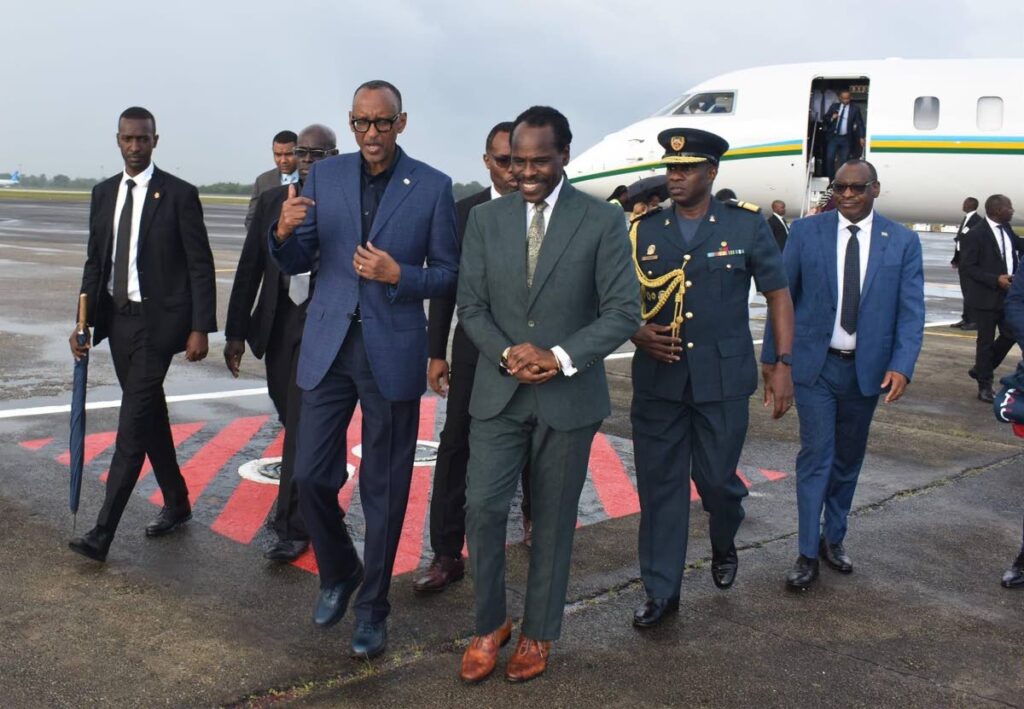Rwandan President calls for 'concrete initiatives' between Africa, Caricom

PRESIDENT of Rwanda, Paul Kagame, says the time for merely indicating interest in collaborating with Africa has passed and that Caricom must do so "in real terms to focus on concrete initiatives."
Kagame was in TT for the 45th Caricom heads of government summit which began on Monday and ended on Wednesday.
Speaking at the Hyatt Regency, Port of Spain, on Wednesday morning, he said it was an honour to attend the summit and hailed Caricom as being one of "the most vibrant regional integration organisations in the world."
While Caricom is celebrating its 50th anniversary, he said the Organization of African Unity – previously called the African Union – is celebrating its 60th.
"These anniversaries are an opportunity to respond to the desire for closer collaboration between our two regions. We are closely linked.
"The horrors of the Middle Passage and the indignities of colonialism join our peoples in a shared story of struggle, survival, resilience and, ultimately, renewal."
He said many Caribbean intellectuals and professionals served in Africa just after independence and helped build the continent's new institutions.
He said the African diaspora has called for deeper co-operation with the Caribbean and that it has been reciprocated.
"But I want to suggest that it is past time to go beyond declarations of intent. We need to come together in real terms and focus on concrete initiatives which address the challenges that nations like ours face today. It is possible to do so.
"Since (Barbados) Prime Minister Mia Mottley launched the Bridgetown Initiative last year, we are already seeing changes in the global conversation on climate, vulnerability, and debt."
He continued, "Countries like ours can’t print money when we face a crisis. We have to borrow. Yet some of us are no longer eligible for concessional interest rates.
"Tools like the United Nations Multidimensional Vulnerability Index, and the Commonwealth’s Universal Vulnerability Index reveal the special needs of small-island developing states."
He said African countries such as Seychelles face climate financing difficulties similar to those in the Caribbean.
"We can work together to advocate for a more responsive and inclusive international financial architecture."
He said Rwanda will host the third UN conference on landlocked developing countries in June, noting there are similarities between those countries and small-island states.
"We could think of it as a coalition of the landlocked and the sea-locked, if you will, working together to make sure our voices are heard," he said.
"But money isn’t everything, and we should concentrate on what we can do on our own, without waiting for anyone else’s approval or funding.
"The geopolitical interests that underpin the international system are not going to change easily or quickly. Change won’t happen, just because it’s the right thing to do, or because we point out the unfairness."
He said blaming others for one's own problems should not happen as the starting point is "how we govern our own individual countries, striving to be the best we can be, with a culture of accountability."
He said smaller countries gather strength from working together in regional organisations, integrating economies and sharing infrastructure costs.
"Building on the co-operation within our respective regions, how ever imperfect it might be, we are in a good position to collaborate across regions.
"That really involves enabling the free movement of people by removing obstacles to travel and exchange."
He said Guyana, Barbados, and Rwanda have embarked on a programme of mutual support for the local manufacturing of vaccines and medicines.
The next step, he added, is to commit to a "pooled procurement mechanism" to ensure these facilities are sustainable.
"Another clear opportunity is to solve the issues of connectivity between Africa and the Caribbean in terms of transport and telecommunications.
"Digital jobs will be a critical driver for highquality youth employment for our economies, and also a key lever for offering our brightest young people an alternative to migration."
Commenting on ongoing struggles in Haiti, he said his own country's history shows that no matter how bad things are, "nothing is beyond repair and there is always a way forward.
"The turning point starts with the leaders in the country and the wider region, at different levels, coming together to forge a new, unified path. When that process begins to occur, then external support can be part of the solution, instead of being part of the problem.
"Let’s come together, as Africa and the Caribbean, and do the best we can for ourselves and our people. If we are determined to join forces, there is no one who can impede that. More importantly, it will benefit all of us."


Comments
"Rwandan President calls for ‘concrete initiatives’ between Africa, Caricom"